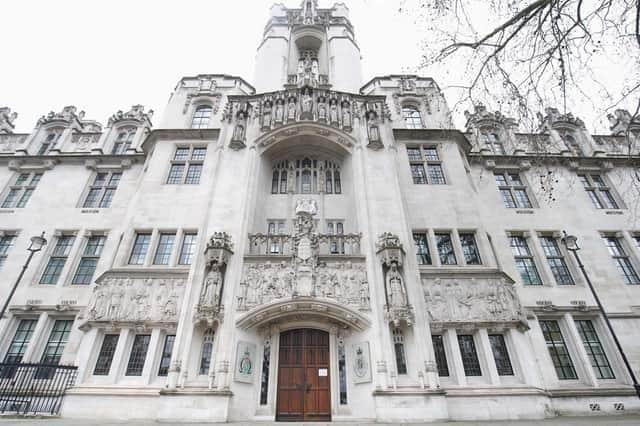Scottish Government's referendum case contrary to common sense, Supreme Court told
Sir James Eadie KC, a senior lawyer acting for the UK Government, said the Union is reserved to Westminster and the draft referendum Bill planned by SNP ministers “self-evidently” relates to this.
He said: "The impacts and effects of Scottish independence would be felt throughout the United Kingdom.
Advertisement
Hide AdAdvertisement
Hide Ad"All parts of the United Kingdom have an interest in that issue, not just Scotland, and it’s obvious why it’s reserved to the UK Parliament.


"It’s of critical importance to the UK as a whole. The Union is the constitutional foundation of the modern British state.”
Earlier, he said the question of whether the Scottish Parliament has the power to legislate for another vote should not be “farmed out” to the Supreme Court.
He argued the problem is that the Scottish Government does “not like” the answer it received from its law officer, the Lord Advocate, on the competence of its referendum Bill.
Sir James, appearing on behalf of the Advocate General for Scotland, made his submission on the second and last day of an unprecedented hearing at the Supreme Court in London.
Lord Advocate Dorothy Bain KC has asked judges to resolve the issue of whether Holyrood has the power to bring forward the Scottish Independence Referendum Bill.
She previously said she could not “clear” the introduction of the legislation as she was not confident it did, but argued her role is not to be “ultimate arbiter” on the issue.
Sir James said the Lord Advocate’s request risked “dragging the court into the political process” in order to provide advice whenever law officers in devolved administrations “think a question is interesting”.
Advertisement
Hide AdAdvertisement
Hide AdHe said the reference should be thrown out as no legislation has been scrutinised and passed by MSPs.
Ms Bain said Sir James’ suggestion that things would be done “willy-nilly” belittled “the enormity of the issue that has been brought to this court”.
She said the matter had been “festering” since devolution, adding: “And in this context, we have taken the responsible, the correct constitutional role in bringing this matter for a reference.
"And Sir James’s characterisation of what is involved here is unfair… It’s just not right that he should say what he’s said about why we’re here. It’s so unfair.”
First Minister Nicola Sturgeon wants to hold a referendum in October next year, but the UK Government has refused to agree to this. This means a repeat of the 2014 vote, which was agreed between the two governments, is not possible.
The Supreme Court is examining whether it has “jurisdiction” to rule on a draft Bill, and whether such legislation is outwith Holyrood’s powers.
Much of the legal argument centres on differing interpretations of the Scotland Act 1998, which says matters relating to the Union are reserved to Westminster.
On Tuesday, Ms Bain said the advisory referendum planned by the Scottish Government would have "no prescribed legal consequences" and would simply seek to ascertain the views of the people of Scotland.
Advertisement
Hide AdAdvertisement
Hide AdBut Sir James rejected this argument, saying: “This is, to put it at its lowest, a strange reference legally.
"It comes to the court in circumstances in which the Scottish Government has not even felt able to introduce a Bill into the Scottish Parliament on the apparent basis that their own law officer is unable to say that the Bill will be within competence.
"And it comes to the court in circumstances in which it is perfectly obvious that the Scottish Government want to produce legislation in Scotland in order to advance, as they see it, their avowed political agenda of independence and thus ending the Union.
"And yet in the same breath they seek to assert that their draft Bill does not even relate to the Union.
"If in this context this draft Bill does not relate to the Union, it requires an interpretation of the words ‘relates to’ which is contrary, we submit, to all of ordinary language, this court’s consistent case law and common sense.
"And that is neither a coherent nor, we submit, an attractive place for them to be, or to submit that the court should find itself in.”
Sir James said the Union is reserved and the Scottish Government’s draft Bill is “self-evidently, squarely and directly” about this.
The draft Bill would set up a referendum, he said, adding: “The fact that the referendum is not self-executing does not support, still less mean, that the draft Bill does not relate to the Union.”
Advertisement
Hide AdAdvertisement
Hide AdHe said the Bill would provide a “legal basis” for a referendum, adding: “It is evident that [the Scottish Government] consider and intend that the referendum will further the cause of independence.”
Sir James also quoted comments by Nicola Sturgeon to advance his case.
He said: “The First Minister’s statement to the Scottish Parliament in connection with this reference on June 28 makes clear that she wishes to introduce and pass the draft Bill to further the cause of independence.”
He said the Lord Advocate’s argument that the legal effects of the draft Bill are “relevantly nil” is “both an ironic and an irrelevant plea”.
Sir James said there is a need for statutory authority in order to authorise “the significant public resource that would be needed to conduct a referendum”.
On Tuesday, Supreme Court president Lord Reed said it may take “some months” for the court to reach a decision on the case.
Closing the hearings, he said the panel of five judges would “require time to consider” the matter, adding: “But we appreciate the importance of this, and we’ll let you have our judgement as soon as we can.”
Comments
Want to join the conversation? Please or to comment on this article.
